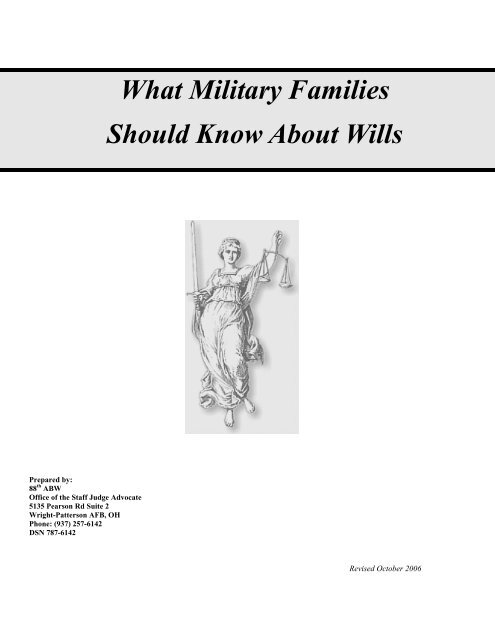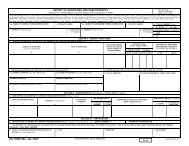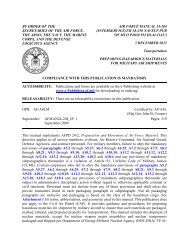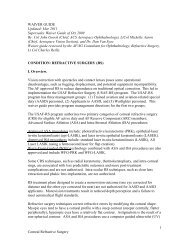What Military Families Should Know About Wills - Wright-Patterson ...
What Military Families Should Know About Wills - Wright-Patterson ...
What Military Families Should Know About Wills - Wright-Patterson ...
Create successful ePaper yourself
Turn your PDF publications into a flip-book with our unique Google optimized e-Paper software.
<strong>What</strong> <strong>Military</strong> <strong>Families</strong><strong>Should</strong> <strong>Know</strong> <strong>About</strong> <strong>Wills</strong>Prepared by:88 th ABWOffice of the Staff Judge Advocate5135 Pearson Rd Suite 2<strong>Wright</strong>-<strong>Patterson</strong> AFB, OHPhone: (937) 257-6142DSN 787-6142Revised October 2006
A will is a written declaration of how you want your property to be distributed after yourdeath. By means of a will, you can appoint a person or institution (executor) to manage yourestate and carry out the desires expressed in the will (i.e. make sure all expenses are paid andyour property is distributed as you wish. In addition, you can name a person (guardian) to takecare of your minor children and their property upon the death of both parents. With very fewexceptions, any attempt to direct the disposition of your property after your death must meet theformal requirements of a will to be legally binding. If you should die without a will, the state willdistribute your property in accordance with state laws. A court will also appoint a person tomanage your estate and a guardian for your children.Why you may need a will: In most states, if a person dies without a will, leaving a spousewith no children, the entire estate goes to the spouse. If one dies leaving a spouse and children,then a certain percentage of property goes to your spouse and the remainder goes to the children.If one dies leaving neither a spouse nor a child, then your entire estate will go to your parents.You may ask then, why a will if that is my desire? A few examples are provided for youto consider. Without a will, if the children are minors, a guardian could be appointed to look aftertheir property. Probably, the court would appoint your spouse who would have to pay for a bond.The spouse might not be permitted to use any part of the children's share of the property, evenfor their own support and education, unless permission is obtained from the court. An accountingwould have to be filed with the court periodically, showing what was done with the children'sshare of the property and the spouse might be required to appear in court to explain it. Thiscauses inconvenience, and is expensive as well.Will worksheets are available at the Legal Office and on our website:https://wwwmil.wpafb.af.mil/base/legal. Each person who wants a will must complete aworksheet prior to consulting with an attorney. Once you have completed the worksheet, youmay meet with an attorney during legal assistance hours. If you and your spouse are preparingwills, you must both meet with an attorney. At your election, you may meet with the same ordifferent attorneys.Our attorneys do not prepare lengthy or complex wills.This has been prepared to assist you in making the basic decisions about what your will shouldcontain. Reading this is not a substitute for consulting with an attorney.INSTRUCTIONS AND EXPLANATION FOR COMPLETING WORKSHEETPersonal InformationFill in all the information on the will worksheet as completely as possible. Use full legalnames (not nicknames).
Asset InformationTo properly distribute your property by a will, it is important that you be aware of all yourassets and their values as any assets not included in the will are distributed per state law as describedin the example of why you need a will above. More importantly, adverse tax consequences can occurif your estate is greater than $1,000,000 in value. For federal estate tax purposes, this amountincludes everything you own, including real estate and life insurance. The Legal Office recommendsthat if your estate is over $1,000,000 you should see a civilian attorney who is an estate-planningspecialist. A small investment in time and money spent now will be well worth the tax savings later.Disposition of PropertyThe most important provisions of your will are those directing to whom your property willgo. The persons who take under your will are called beneficiaries. This worksheet provides foralternate beneficiaries in the event that your primary beneficiary should predecease you. Whenproviding the names of your beneficiaries use their full legal name(s) (not nicknames).If you choose to divide your property among a group of people (e.g., your children), there arevarying ways to provide for the distribution. The first way is to have your property divided equallyamong those members of the group who survive you. That is, if one member predeceases you,his/her share will be divided among the remaining members of the group. Another method ofdistribution allows for your property to pass to the deceased member’s descendants. This method isknown as per stirpes. Leaving your property to your children per stirpes is the most popular waybecause if one of your children should predecease you, your grandchildren will be provided for inyour child’s stead. The following example is designed to explain the difference through acomparison:Per StirpesYouSurviving ChildrenYouSue Sam (died) Sue Sam (died)50% 100%Lisa Don Lisa Don25% 25% 0% 0%In the above example, you divide your property equally between your two children, Sueand Sam. During your lifetime Sam has two children, Lisa and Don. Sam then dies before yourdo.Under per stirpes, Sue would still receive her ½ interest in your estate (the same amountshe would have received had Sam lived), and Lisa and Don would split Sam’s ½ interest (that hewould have received if she lived), giving each a ¼ interest. The other method, ending at yoursurviving children leaves your grandchildren, Lisa and Don, with nothing.
There is no requirement, however, that you divide your property evenly among yourdescendants. You can divide your property any way you wish.If any of your intended beneficiaries have a mental or physical disability any assets theyreceive from you through your will might impact their ability to receive state and federalassistance. You need to discuss these potential issues with your attorney.GuardiansIf you currently have minor children, you should provide for a guardian and alternateguardian in your will. An alternate guardian may be needed in the event that your initialguardian predeceases you or elects not to be the guardian. All parties involved are better off ifyou discuss a potential guardianship with the guardian(s) before naming them in your will. Theguardianship provision will normally take effect only if the child’s other natural/adoptive parentpredeceases you. Your designation of a guardian is not legally binding on the courts, but theywill appoint that person if they feel the person is qualified and it is in the best interest of the childto do so.There are two types of guardians: guardian of the person and guardian of the property.The same person usually serves as both, but this is not mandatory. The guardian of the person ischarged with the legal responsibility of raising your children in the event of the death of both youand your spouse. The guardian of the property plays a role similar to that of a Trustee asdiscussed below. If you have an adult child with a disability your attorney can assist you inproviding for a guardian for him or her as well.TrustsA trust is a mechanism by which you give legal title to property to a trustee to manage forthe benefit of a beneficiary. A trustee can be a relative, friend, banking institution, or any otherqualified persons. Commonly, trusts are set up to ensure that minor children will have moneyavailable for their education and to protect the assets from being used unwisely. At the LegalOffice, we will only create simple trusts for the benefit of children. The trust will not limit thepowers of the trustee, will require the termination of the trust to be based upon a specified age,and will be created for the entire estate.A trust can be an expensive undertaking, and should not usually be considered unless theestate has substantial assets or there are blended family concerns. Life insurance policies shouldbe considered assets when determining whether a trust is needed. Note, however, you will needto coordinate with your insurance company to ensure that the proceeds will go to the trust andnot directly to the minor children.The trust will terminate at the age specified in the will, and the trust must convey the trustproperty to the beneficiary(ies). It can be terminated, that is, the property can be conveyed, to
each child when they reach the specified age, or to all when the youngest child reaches thespecified age.If you create a trust, you must make sure you provide for a way to fund the trust. Themost common way to do this is through insurance proceeds. Your attorney can provide youfurther details on this matter.Executor(Executrix)/Personal RepresentativeAn executor (executrix if a woman) or a personal representative is the person who sees toit that the wishes expressed in your will are properly carried out. Some of the responsibilities ofan executor are: gather and perform an inventory of your assets; pay your debts, funeral expensesand taxes; sell property if necessary for distribution; and distribute the remainder of your assetsaccording to the terms of your will.The surviving spouse may, but does not have to, be listed as the executor/executrix. Anyrelative, friend or professional whom you trust may serve in this capacity. Theexecutor/executrix must be over the age of 18. It is wise to appoint an alternate in case your firstchoice is unwilling or unable to act as an executor/executrix.In addition, some states require that the executor post a bond. Bonding is a way ofassuring that your executor performs the duties required by law. Since posting a bond can be afinancial burden on the estate, our standard wills exempt the executor from this requirement. Ifyou would like a bond to be posted, please inform the attorney at the interview. Most states alsogive the executor the Power of Sale. This gives the executor the authority to sell property anddistribute the proceeds as he/she deems fit in order to comply with the terms of the will. If youwish to eliminate this power, inform the attorney preparing your will.SGLI and Other Life Insurance Policies, Bank Accounts, and StocksA will has no effect on your life insurance policy or any other investment that has anamed beneficiary. SGLI and other insurance policies are contracts between you, the insured,and the insurance/investment company, the insurer. The insurer or investment company willdistribute the proceeds of the policy to the beneficiaries identified in the insurance policy orcontract. The company will not follow your instructions in the your will unless you tell them todo so. Therefore, it is extremely important that you notify the insurer, bank, or investmentcompany that you want to change the beneficiaries.Also if you have a safety deposit box make sure that in the event of death orincompetency that the bank will allow your executor access to the safety deposit box. The willmay or may not be able to allow the executor access. Ask your financial institution for furtherdetails.If you decide, after discussing it with your attorney, to establish a trust or a custodianshipunder the Uniform Gifts to Minors Act or the Uniform Transfers to Minors Act (UGMA/UTMA)
for your child, you must change your insurance policies in order to fund the trust. Discuss withyour attorney what language you should use to update your policy. Once your will is completed,you will need to go to Personnel at <strong>Military</strong> Personnel Flight and ask for a new beneficiarydelegation form to update your SGLI.For all other insurance policies, you must contact the insurer for a formal change ofbeneficiary form. Again, you should discuss your desires with your attorney and your insurancecompany to make certain your desires are followed.Optional Ancillary DocumentsLiving WillA living will is not part of your will at all. But this is a good time to consider whetheryou want a living will, which is more accurately called an advance medical directive ordeclaration. This document becomes operative in the event your physician determines that youhave a terminal, incurable medical condition, and your life is only prolonged by means ofartificially provided life support. Through your living will you can communicate a desire not tohave your life prolonged through the use of artificial life support.You can also communicate any wishes to make or decline any anatomical gifts (AKAorgan donation). You have the ability to authorize the use of your whole body or just specificorgans and tissues. You can also choose how your donation(s) may be used (i.e. transplantation,medical research, medical education). However, the rules do vary from state to state, so youshould discuss your desires with your attorney to make certain your desires are followed andcomply with applicable state law.Once executed, the document is effective until it is revoked, which only you may do atany time by physically destroying the document or, in an emergency, by verbally revoking itbefore witnesses who can testify that you did, in fact, revoke it.Durable Power Of Attorney for Health CareA scenario often not accounted for is if you become unable to make your own medicaldecisions, but are not deemed to be terminally ill. Who makes medical decisions for you? Thatquestion is answered by another important health care document, the durable power of attorneyfor medical care. You may execute this document in addition to the living will. This documentappoints someone to make medical care decisions for you in the event that you cannot make yourown medical decisions. The living will only addresses the issue of continued life support whenyou have a terminal condition. Unlike the living will, the power of attorney for medical caregives the person you designate as your agent the authority to make a wide range of medicaldecisions on your behalf. It also gives your agent access to your medical information andauthority to fully participate with your treating physicians in deciding the care to be provided toyou.
You can designate anyone who is 18 years of age or older to be your agent except yourphysician or the administrator of your health care facility. However, the person you designate tobe your agent should be someone you trust with life and death decisions. It is also important toremember that decisions about your health vest with your doctor, family members, or possibly acourt if you are without a durable power of attorney for health care or a living will.Springing Durable General Power Of AttorneyYour will enables you to dispose of your property as you wish after your death. Whileyou are living, you have the right to decide what happens to that property so long as you are ofsound mind. But if you ever become incapacitated, whether through illness or accident and areunable to handle your own affairs, a court order may revoke your right to manage your ownmoney and appoint a guardian or conservator. To protect yourself from this eventuality, you canappoint an agent for yourself through a power of attorney.A power of attorney is simply a written authorization for someone to act on your behalf,for whatever purpose you designate in writing. Ordinarily, a power of attorney expires if youbecome mentally disabled – the time when you need help the most. A springing durable powerof attorney can take effect when you become unable to manage your own personal and financialaffairs and will last as long as you are alive or until you revoke it. As long as you are mentallycompetent, you can revoke a durable power of attorney whenever you like simply by destroyingthe document.If you choose to have a springing durable general power of attorney, remember to namesomeone who you trust as your attorney-in-fact. Your attorney-in-fact will have great authorityover your affairs. Not only can he/she keep your affairs in order, but he/she has the potential toabuse this document at your expense and his/her gain.Other Important InformationApplicable State Law: A will drafted at the Legal Office will meet the requirements ofall 50 states.Will’s Effect on Property held in Joint Tenancy: Property titled in the form of jointtenancy with “right to survivorship” (frequently homes, cars, bank accounts) passesautomatically to the surviving owner(s). "Joint tenancy with right of survivorship" in Ohio is aform of co-ownership of property whereby two or more persons own property together. On thedeath of one joint owner, proceedings may still be required to transfer title of certain assets andto determine taxes. Joint tenancy can be a useful device in certain situations.Final Pay and Allowances: Federal law provides that final pay and allowances, andother moneys that may be owed on account of military service, will be paid to the beneficiarieson DD Form 93 (available at the MPF). It is important that this record accurately reflects yourdesires.
Changing your Will: As a general rule, a will has to be signed and witnessed before it islegally effective. Sometimes an event will occur that prompts you to change your will. You mayuse a codicil to make simple changes, such as naming a different executor. A codicil is a legaldocument that is added to your will. It must be prepared with the same formalities as your will,so do not cross out words, or write on your original will as this may invalidate it. If substantialchanges need to be made, a new will can be written that will revoke the previous will.One should consider changing or at a minimum reviewing a current will if (1) you getmarried, divorced, or separated; (2) there is a birth or death in your family affecting abeneficiary, guardian, or executor(rix); (3) you have a large increase or decrease in the assets orasset values of your estate; or (4) you decide to change how you want your assets distributed.The information contained in this pamphlet is intended to provide you with a generaloverview of the law. It is not intended to be comprehensive, and should not be consideredlegal advice. If you have questions you should contact an attorney.A military legal assistance attorney can provide guidance on these matters free of charge to allactive duty personnel and their dependents along with reservists and guardsmen on federal activeduty and their dependents. In addition, retired personnel, their dependents, and dependentsurvivors may also receive legal assistance to the extent personnel and facilities are available.To schedule an appointment to discuss these or other legal matters you can contact the <strong>Wright</strong>-<strong>Patterson</strong> Air Force Base, 88 th Air Base Wing Legal Assistance Office at (937) 257-6142, DSN787-6142.
















